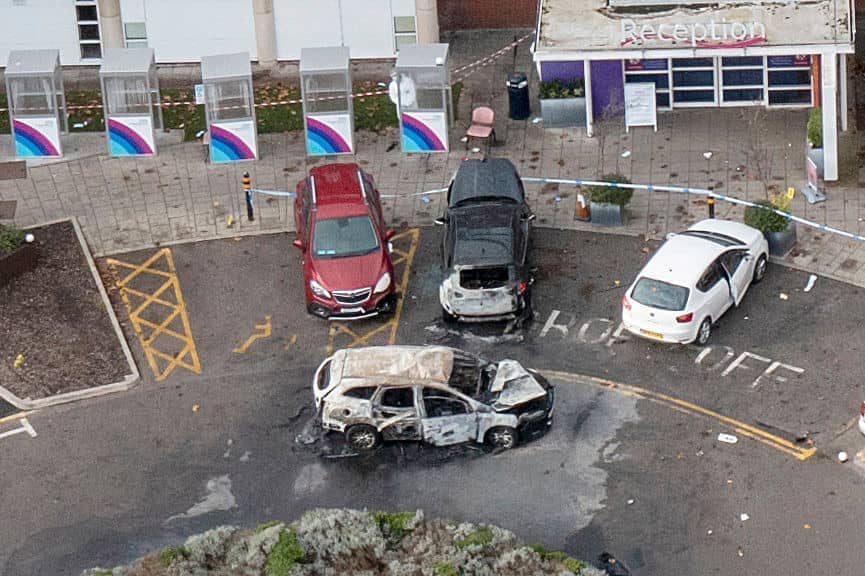Emmanuel Macron told his people last summer they would have to learn to live with Covid. A year-and-a-half on, France is unrecognisable to the country it once was: Covid passports are in force and face masks remain mandatory in many places. The president of France is not alone among Western leaders in his uncompromising approach to the pandemic: Holland, Austria and Germany are re-imposing restrictions and Boris Johnson, who used the ‘learn to live with it’ line in July, has refused to rule out a Christmas lockdown.
Yet while Europe’s presidents and prime ministers appear ready to go to any length to protect their people from this virus, their approach to another threat – the danger posed by Islamist terrorism – is far more insouciant.
In 2015, shortly after Islamists had slaughtered 130 people on the streets of Paris, Manuel Valls, the then prime minister of France, announced that this form of terrorism is ‘a lasting threat we are going to have to learn to live with’.
Valls repeated his message in the summer of 2016 after 86 people had been massacred in Nice. His declaration prompted the New York Times to invite several prominent commentators to debate his remarks. Michael B. Mukasey, the United States attorney general from 2007 to 2009, was scathing, accusing the French prime minister of ‘shaming himself’ with his weak words. He then added a warning about the Islamists’ strategy:
Islamist attacks are now so commonplace they come and go in media outlets within 24 hours.
‘Their goal is to impose their will on the world…by shaking the confidence of citizens that their governments can do what governments principally are there for, which is to keep them safe.’
Islamist attacks are now so commonplace they come and go in media outlets within 24 hours. This indifference, this banalisation, is part of the ‘learn to live with it’ approach espoused by the French government under Socialist president Francois Hollande.
Last week, Hollande, head of state at the time of the Bataclan attack, testified at the trial of 14 men accused of conspiring in the co-ordinated assault. He admitted that his government knew that Islamists were preparing attacks on France: ‘Every day we were under threat,’ he told the court. ‘We knew that there were operations being prepared, individuals who mixed with the flow of refugees, leaders in Syria. We knew all that.’
In the lead-up to the assault on Paris, at least one member of the terrorist cell commuted between Europe and Syria as the operation was finalised, exploiting the route effectively opened up by Angela Merkel in August 2015.
Hollande’s confession was seized on by Eric Zemmour, who, in a rally in Bordeaux last week, told his audience that the authorities ‘were aware of the danger and preferred that French people should die rather than prevent migrants coming to France’. Zemmour’s remarks elicited a strong response from Hollande and also Valls, who accused him of trying to ‘sow doubt and hate’.
Yet this is what Islamists have been doing in France for decades. That they have been so successful is because of decades of institutional complacency. There has been some pushback from Paris under Emmanuel Macron, a realisation that a parallel society with values antithetical to Republican ones, has taken root. But it is too late? A 2018 report by the intelligence agency, the DGSI, stated that ‘Islamic fundamentalism has reached a critical threshold in France that from now on presents a veritable danger to the nation’s democracy.’
Is something similar happening in Britain? Less than a fortnight after the murder of David Amess, police officers visited an MP who had expressed support for halal meat reforms. Strengthen your security detail, the MP was advised, and ‘be careful what you say publicly on this issue’.
This is the terrifying ‘new normal’ that few are prepared to acknowledge: a Britain where terrorist attacks remain a constant source of fear for many. Sixteen years after 52 people lost their lives in the London bombings, Britain has made no real inroads against radical Islam in any shape or form. The Prevent programme is no longer fit for purpose. Britain’s asylum policy is not only ‘dysfunctional’, as the Home Secretary put it this week, but a danger to the nation. Meanwhile, the fear of being labelled racist pervades society to such an extent that a security guard at the Manchester Arena, on the night of May 22 2017, was wary of reporting his suspicions about the suicide bomber because he was scared he would be labelled a racist.
This is what learning to live with terrorism looks like; not so much Keep Calm and Carry On but keep cowed and carry on. We hope it doesn’t happen to us, that we are not in the wrong place at the wrong time or, if we are, we have the incredible good fortune of the Liverpool taxi driver last Sunday.
Instead, our leaders go to war against a virus, which they find much easier to fight. How strong and authoritative they feel as they curtail our liberty; for our own protection, they tell us. Yet when it comes to keeping us safe from Islamist extremism they offer us nothing other than evasions and empty promises.







Comments